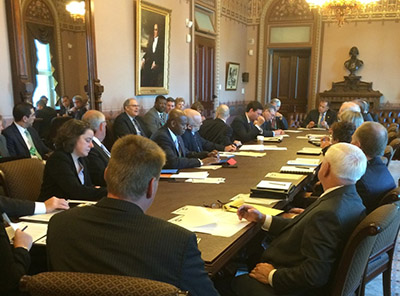
(ARLINGTON, VA.) — National Rural Electric Cooperative Association (NRECA) CEO Jo Ann Emerson joined co-op leaders and officials from the White House Rural Council and the USDA’s Rural Utilities Service (RUS) today to discuss recent progress and potential collaboration on efficiency and renewable energy development.
“We had a productive conversation about how we can maximize the value of current federal programs and find creative opportunities to extend the benefits of new efficiency and renewable energy technologies to co-op consumers,” said Jo Ann Emerson.
“At Roanoke Electric Cooperative, we have leveraged RUS loan programs to help our members reduce their energy use,” said Curtis Wynn, CEO of Roanoke Electric Cooperative in North Carolina. “The long-standing partnership between co-ops and the RUS enables us to better serve our members through improving their quality of life. I believe this conversation paves the way for more collaboration.”
Co-ops have been aggressively adding renewable energy capacity to the rural electric grid. The nation’s more than 900 co-ops own or purchase about 16.5 GW of renewable capacity and plan to add 2 GW of capacity in the near future.
Co-op development of community solar has surged: co-ops have developed 43 community solar arrays and are planning another 35 projects in a total of 24 states.
Participants will discuss, among other topics, the Rural Utilities Service Energy Efficiency and Conservation Loan Program (EECLP), a program offering loans to finance energy efficiency and conservation projects for commercial, industrial, and residential consumers. Under this program, co-ops can re-lend the money to members to develop new and diverse energy service products within their service territories.
Many co-ops view maximizing co-op and end-user efficiency as a key component in a broader strategy to meeting the challenges of growing electricity demand and rising costs. According to NRECA research, 82 percent of cooperatives offer energy efficiency programs to their members. More specifically,
- 67 percent offer residential energy audits;
- 42 percent provide energy usage data online; and
- 39 percent offer weatherization and conservation services.
The National Rural Electric Cooperative Association is the national service organization that represents the nation’s more than 900 private, not-for-profit, consumer-owned electric cooperatives, which provide service to 42 million people in 47 states.